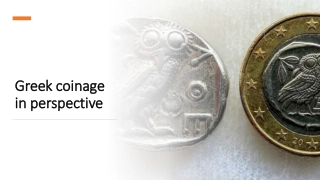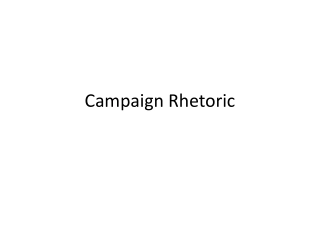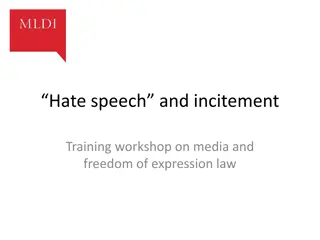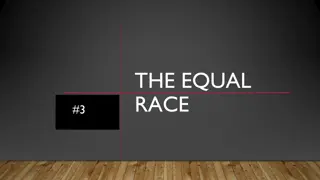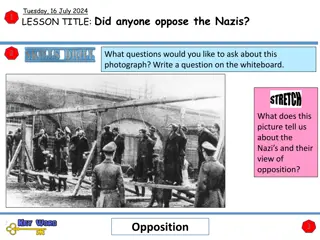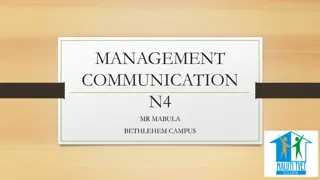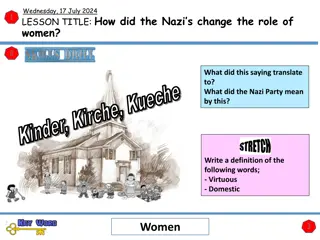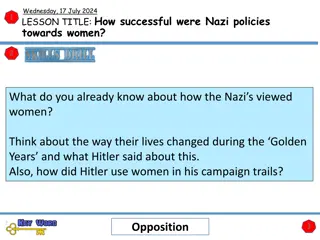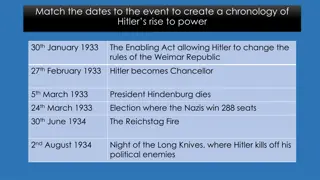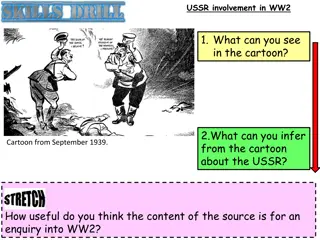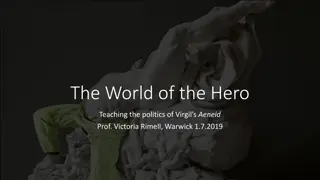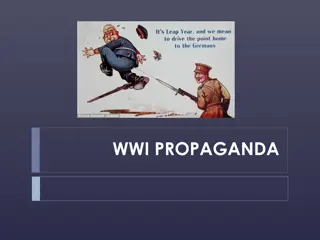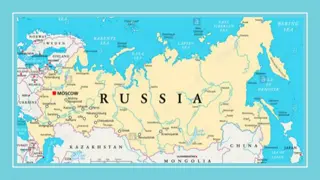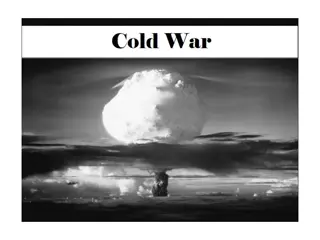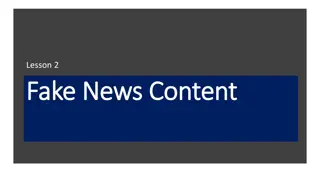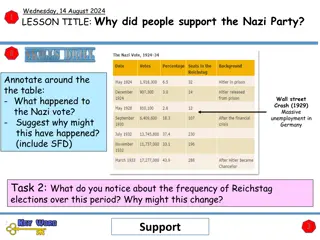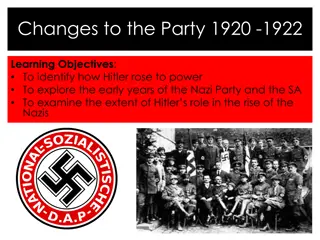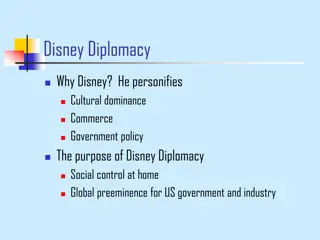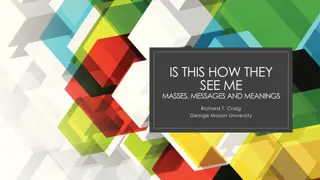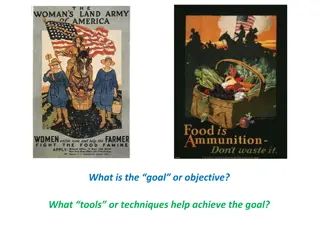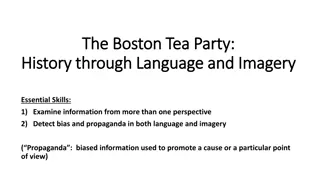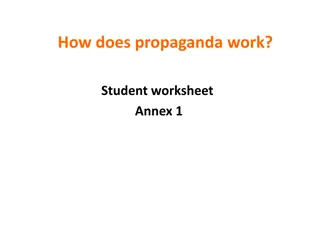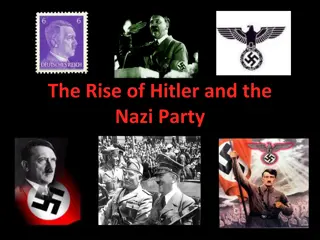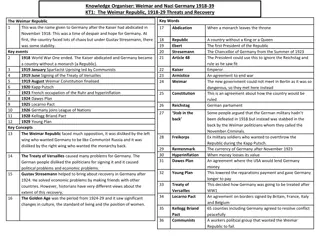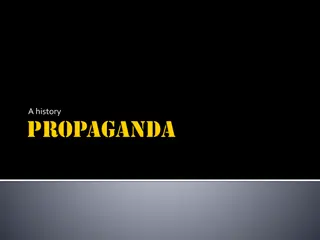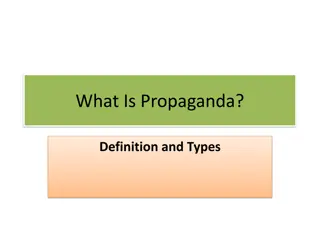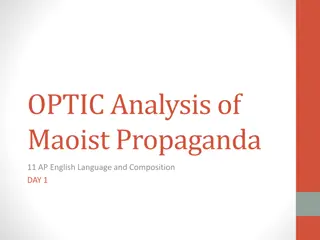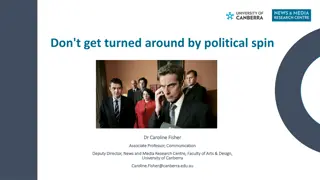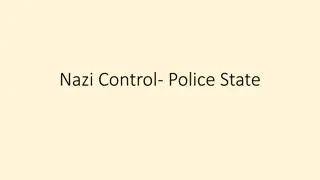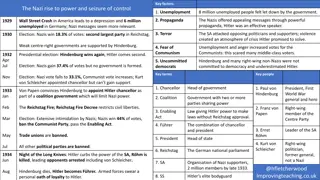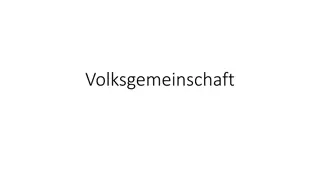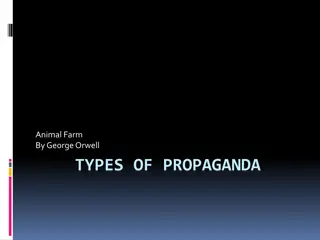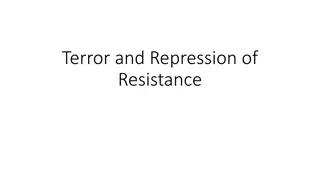Greek coinage in perspective
Explore ancient Greek coinage practices and their modern parallels. Discover attitudes, practices, and the intersection of money with propaganda throughout history.
1 views • 30 slides
Campaign Rhetoric
Rhetoric, the art of persuasive language use, plays a crucial role in political campaigns, focusing on public speaking to sway audience opinions. The ethical implications, such as the use of noble ideas versus dishonest strategies, are also key considerations. Factors affecting persuasiveness includ
0 views • 51 slides
Understanding Hate Speech and Incitement in Media and Freedom of Expression Law
This workshop explores the legal implications surrounding hate speech, incitement, and freedom of expression. It delves into the prohibition of propaganda for war, advocacy of hatred, and the balance between state obligations and freedom of speech. Through case law examples like the Jersild case and
1 views • 12 slides
Exploring Symbolism Through Art: Lessons from The Equal Race Mural Project
The presentation outlines "The Equal Race" mural project by Julie Hussey, Alia Oakes, Teagan Tate, and Audrey Thompson, inspired by the Holocaust. It delves into the project's core themes, including hope, despair, and resilience, depicted through a mural featuring a Jewish family, Nazi propaganda, a
1 views • 10 slides
Opposition to Nazis: Youth Groups and Resistance Movements
Explore various forms of opposition to the Nazis through youth groups like the Swing Youth and Edelweiss Pirates. Learn about their defiance against the Nazi regime, including activities and methods of resistance. Discover the diversity of opposition movements and their impact on Nazi Germany's cont
0 views • 10 slides
Understanding Mass Media and Advertising in Management Communication N4
Explore the role of mass media and advertising in communication processes, including types of media, functions of mass media, language choices, manipulative reporting, propaganda techniques, advertising principles, and effective advertising requirements. Engage in various activities to enhance learn
3 views • 6 slides
Women's Role in Nazi Germany: Impact and Ideology
Explore how the Nazis shaped the role of women through policies and propaganda, emphasizing domesticity and motherhood. Analyze key figures like Joseph Goebbels and Hitler's perspectives on women's place in society. Understand the contrast between women's lives in Weimar and Nazi Germany.
0 views • 18 slides
Nazi Policies Towards Women: A Critical Analysis
Nazi policies towards women aimed to control and manipulate their roles in society, focusing on reducing women in the workforce, promoting Aryan reproduction, emphasizing purity and health, and encouraging Aryan marriage. These policies restricted women's freedoms and autonomy, enforcing strict guid
0 views • 11 slides
The Rise of Hitler: Establishing the Nazi Police State in Germany
This content chronicles the key events leading to Hitler's rise to power in Germany, focusing on the establishment of the Nazi Police State through propaganda, surveillance, and punishment. It discusses Hitler's use of violence, propaganda, and speeches to solidify his control. The effectiveness and
0 views • 9 slides
The USSR and Nazi Germany: The Pact of 1939
In the lead-up to WWII, the USSR signed a non-aggression pact with Nazi Germany, shocking the world. This pact included secret clauses dividing Poland and avoiding conflict for ten years. The USSR's alliance with Germany was a strategic move by Stalin due to fear of invasion and perceived weakness o
0 views • 13 slides
Understanding Dystopian Societies in 1984 Novel Guide
Explore the themes of utopia and dystopia in George Orwell's 1984 novel through a comprehensive guide. Learn about the characteristics of dystopian societies, types of controls, and the role of protagonists in challenging oppressive systems. Dive into the discussions on propaganda, surveillance, deh
0 views • 10 slides
Retrieval Practice in Animal Farm: Lessons on Communism, Allegories, and Propaganda
In this detailed study guide, explore key themes from George Orwell's "Animal Farm", focusing on topics like the Communist Manifesto, bourgeoisie representation, capitalism vs. communism, rhetorical strategies, Karl Marx, fables, anthropomorphism, allegories, Russian Revolution parallels, and the us
1 views • 20 slides
Exploring the Politics and Ideals in Virgil's Aeneid
Delve into the complexities of divine intervention, Roman values, and Augustan heroism in Virgil's Aeneid. Unravel the intricate relationship between politics, epic form, and the subversive readings of this classical work. Challenge traditional interpretations and ponder the nuanced interplay of pro
0 views • 11 slides
Understanding Wartime Propaganda in WWI
Wartime propaganda during WWI was employed for various purposes such as recruiting soldiers, financing the war effort, and unifying the country. It used tools like demonization, emotional appeals, patriotic appeals, and half-truths to sway public opinion and support the war. An in-depth analysis of
0 views • 7 slides
The Ruthless Reign of Joseph Stalin in the Soviet Union
Joseph Stalin rose to power in the USSR after Lenin's death, implementing totalitarian control through purges, collectivization, and propaganda. His regime led to millions of deaths, forced labor camps, and a cult of personality, shaping Soviet society through fear and oppression.
0 views • 8 slides
The Cold War: Rivalry and Tension Between Superpowers
The Cold War, lasting from post-World War II to the 1980s, was defined by political tension and rivalry between the United States and the Soviet Union. Despite never engaging in direct military combat, both sides competed through political maneuvering and propaganda, impacting global conflicts and t
0 views • 11 slides
Understanding the Different Types of Misinformation and Fake News
Explore the various forms of misinformation such as fake news, satire, fabrication, manipulation, propaganda, and dissemination. Learn how fake news impacts public perception and how it can mislead individuals. Discover the prevalence of fake news and its effects on society.
2 views • 11 slides
Understanding the Rise of Nazi Party Support
The lesson explores why people supported the Nazi Party in Germany during the early 20th century. It examines factors such as the Wall Street Crash of 1929 and the Weimar government's failures, leading to the rise of Adolf Hitler and the Nazi party. Students analyze different interpretations of the
0 views • 9 slides
The Rise of Hitler and the Changes in the Nazi Party 1920-1922
Explore how Adolf Hitler ascended to power and examine the significant developments within the Nazi Party between 1920 and 1922, including Hitler's role, the creation of the SA, the 25 Point Programme, Hitler's leadership, and the use of propaganda and violence.
0 views • 13 slides
Disney Diplomacy: Cultural Influence and Political Objectives
Disney's role in diplomacy, particularly in South America, reveals a complex interplay between cultural dominance, commercial interests, and government policies. The Good Neighbors Office aimed to counter German propaganda through positive American portrayal, but overlooked cultural differences and
4 views • 8 slides
The Transition from Rural Community to Urban Mass Society: Impact of Media Technologies
Our lives are influenced by the saturation of media technologies and images, leading to questions on American culture and politics. The shift from rural community to urban mass society has resulted in individuals being isolated and disconnected from traditions and values, shaping their hearts and mi
0 views • 16 slides
Understanding Propaganda Techniques
Explore different propaganda techniques such as Name-Calling, Bandwagon, Red Herring, Emotional Appeal, Testimonial, Repetition, Sweeping Generalization, and Circular Argument. These techniques manipulate people's emotions and perceptions to influence their decisions. Be vigilant against these strat
0 views • 26 slides
Analyzing Wartime Propaganda Objectives and Techniques
Explore the objectives and tools utilized in wartime propaganda, including recruitment of soldiers, financing war efforts, unifying nations behind a cause, resource conservation, and fostering home-front support. Delve into common techniques like demonization, emotional appeals, name calling, patrio
0 views • 22 slides
Analyzing Bias and Propaganda in Boston Tea Party History
Explore the Boston Tea Party through language and imagery, learning to examine information from multiple perspectives and detect bias and propaganda. Engage with visual materials, such as political cartoons, and texts like the 1773 Massachusetts Gazette article to determine if they were created by p
0 views • 10 slides
Understanding the Mechanisms of Propaganda Through Historical Examples
Explore the workings of propaganda through historical artifacts from World War I, showcasing how nations used persuasive messaging to influence public opinion, rally support for war efforts, and shape cultural narratives. Images of propaganda posters and war bonds illustrate the powerful impact of v
0 views • 24 slides
Exploring Nazi Folk Community and Social Dynamics in Germany
In this detailed exploration, you will delve into the intricate social structures of the Nazi folk community in Germany. From the expulsion of individuals to the liberalization of sexuality, the role of women, youth organizations, education system coordination, and foreign relations, you will learn
0 views • 11 slides
The Rise of Adolf Hitler and the Nazi Party: A Historical Overview
Adolf Hitler, born in Austria in 1889, faced rejection as a painter before turning to politics. He led the National Socialist German Workers Party (Nazi) and orchestrated the failed Beer Hall Putsch in 1923. Imprisoned briefly, he penned Mein Kampf that propagated Nazi ideology. By 1932, the Nazi Pa
0 views • 15 slides
Weimar and Nazi Germany: A Historical Overview
Germany's tumultuous period from the Weimar Republic to the rise of Hitler's Nazi Party is marked by economic challenges, political unrest, and social transformation. The Weimar Republic faced threats and sought recovery, while Hitler capitalized on the weaknesses of the system to ascend to power in
0 views • 4 slides
The Evolution of Propaganda: From the 1600s to Hitler's Regime
The term "propaganda" originated in the 1600s without a negative connotation until World War I when it became a tool of persuasion and manipulation. Countries utilized propaganda extensively during WWI to sway public opinion. The United States established a propaganda bureau, while Nazi Germany saw
0 views • 32 slides
Lessons from Rwanda: Hatred, Propaganda, and War
Explore the dark era of the Rwandan Genocide, delving into the themes of hatred, propaganda, and warfare. Learn about the use of propaganda in influencing people and its impact during the conflict. Follow the timeline of events leading up to the genocide and the efforts for ceasefire amid escalating
0 views • 5 slides
Understanding Propaganda: Definition, Examples, and Impact
Propaganda is a form of communication that aims to influence the attitudes of a population towards a cause or position. It can be used to manipulate information selectively, evoke emotional responses, and shape perceptions. This article explores the definition of propaganda, its historical context,
0 views • 17 slides
Understanding Maoist Propaganda Through OPTIC Analysis
Explore the use of OPTIC analysis to dissect Maoist propaganda posters from the Chinese Cultural Revolution. Uncover the hidden messages and visual rhetoric employed by the government to influence perceptions and promote certain ideologies.
0 views • 25 slides
Understanding Political Spin and Propaganda in Media
Explore the tactics of political spin and propaganda as tools used to shape public perception and manipulate information. Learn about the techniques politicians employ to navigate media dynamics and the covert spin tactics employed in the realm of communication and journalism.
0 views • 10 slides
The Holocaust: A Comprehensive Overview
The Holocaust was a tragic chapter in history where millions of Jews and other groups were targeted and persecuted by the Nazi regime during World War II. This summary covers key events such as the rise of the Nazi party, establishment of concentration camps, Nuremberg Laws, and the Final Solution.
0 views • 13 slides
Nazi Control in Germany: The Dark Reign of the Police State
The Nazis implemented a strict regime of control in Germany through censorship, propaganda, and the establishment of a powerful police state. They used organizations like the SS, Gestapo, and SD to suppress dissent, monitor the population, and silence opposition. The legal system was manipulated to
0 views • 8 slides
The Nazi Rise to Power and Seizure of Control
The ascent of the Nazi party in Germany was fueled by key factors such as high unemployment, effective propaganda, use of terror tactics, fear of communism, and the inadequacy of the existing democratic leadership. Through a series of events and political maneuvers, Hitler was eventually appointed C
0 views • 5 slides
The Impact of Volksgemeinschaft in Nazi Germany
The concept of Volksgemeinschaft in Nazi Germany aimed to create a racial community of pure Germans while excluding outsiders, especially Jews. It emphasized the Aryan master race, traditional gender roles, and discriminatory policies against minorities. Despite attempts to promote unity and loyalty
0 views • 8 slides
Types of Propaganda Techniques in Animal Farm by George Orwell
Explore different propaganda techniques illustrated in George Orwell's novel, Animal Farm, including bandwagon, testimonial, repetition/hypnotism, plain folks, ego building/snob appeal, emotional words/patriotic slogan, and value/durability. Learn how these techniques manipulate perceptions and shap
1 views • 12 slides
Nazi Control of Germany - Terror and Resistance
Nazi control of Germany under Hitler's regime involved the use of terror, repression, and coercion through agencies like the SS/Gestapo complex. The Gestapo, initially seen as all-powerful, were actually a relatively small force that relied on denunciations from German citizens. The regime instilled
0 views • 31 slides
Overview of Nazi Propaganda and Control Methods
The content discusses different types of Nazi propaganda, the reasons behind Kristallnacht, and the effectiveness of terror as a control method by the Nazis. It highlights how propaganda, violence, and fear were utilized to manipulate and suppress the German population during the Nazi regime.
0 views • 8 slides
